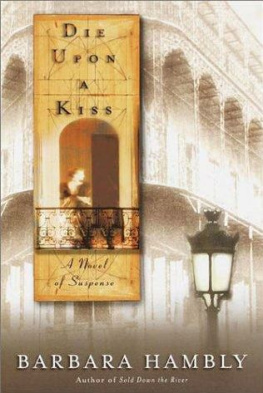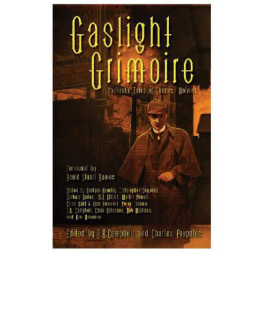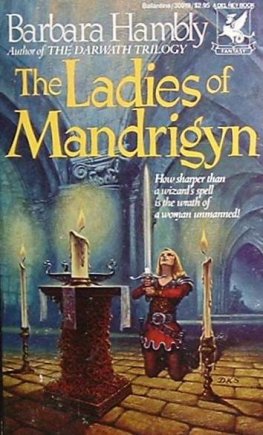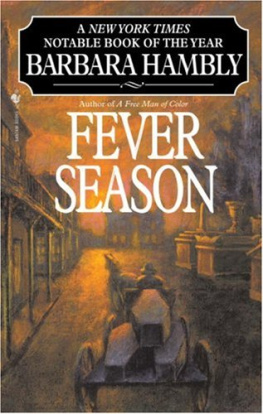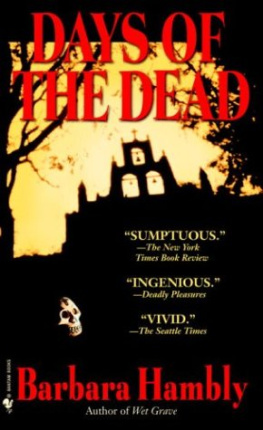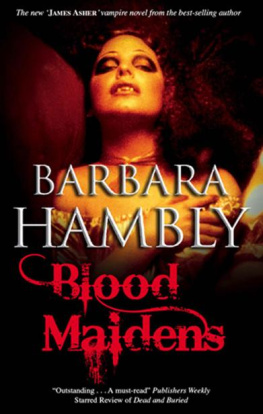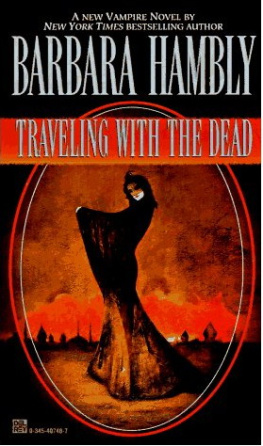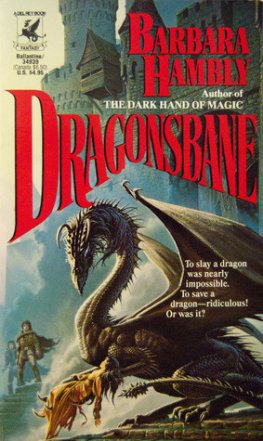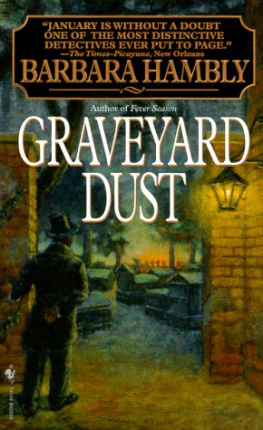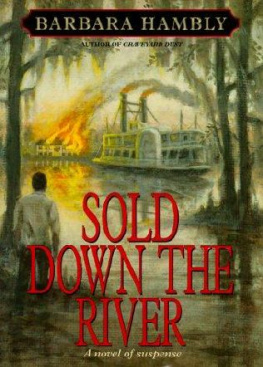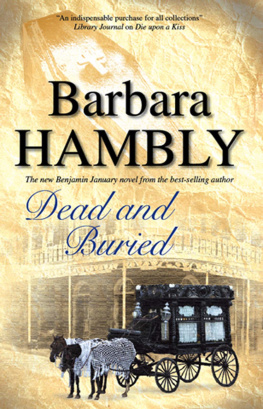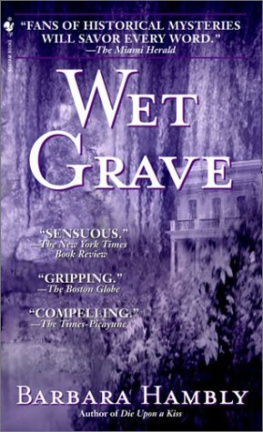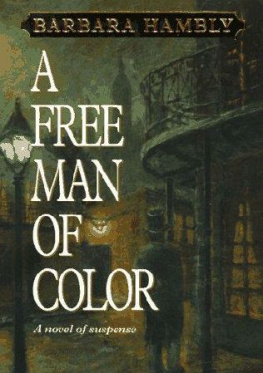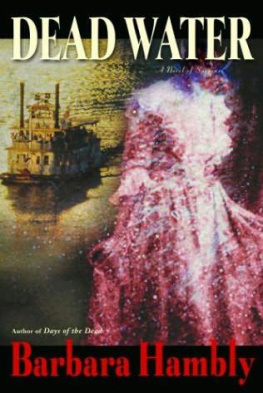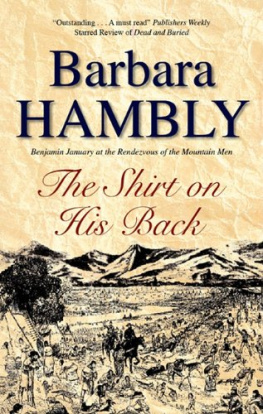Barbara Hambly - Die Upon a Kiss (Benjamin January, Book 5)
Here you can read online Barbara Hambly - Die Upon a Kiss (Benjamin January, Book 5) full text of the book (entire story) in english for free. Download pdf and epub, get meaning, cover and reviews about this ebook. year: 2002, publisher: Random House Publishing Group, genre: Detective and thriller. Description of the work, (preface) as well as reviews are available. Best literature library LitArk.com created for fans of good reading and offers a wide selection of genres:
Romance novel
Science fiction
Adventure
Detective
Science
History
Home and family
Prose
Art
Politics
Computer
Non-fiction
Religion
Business
Children
Humor
Choose a favorite category and find really read worthwhile books. Enjoy immersion in the world of imagination, feel the emotions of the characters or learn something new for yourself, make an fascinating discovery.
- Book:Die Upon a Kiss (Benjamin January, Book 5)
- Author:
- Publisher:Random House Publishing Group
- Genre:
- Year:2002
- Rating:3 / 5
- Favourites:Add to favourites
- Your mark:
- 60
- 1
- 2
- 3
- 4
- 5
Die Upon a Kiss (Benjamin January, Book 5): summary, description and annotation
We offer to read an annotation, description, summary or preface (depends on what the author of the book "Die Upon a Kiss (Benjamin January, Book 5)" wrote himself). If you haven't found the necessary information about the book — write in the comments, we will try to find it.
Die Upon a Kiss (Benjamin January, Book 5) — read online for free the complete book (whole text) full work
Below is the text of the book, divided by pages. System saving the place of the last page read, allows you to conveniently read the book "Die Upon a Kiss (Benjamin January, Book 5)" online for free, without having to search again every time where you left off. Put a bookmark, and you can go to the page where you finished reading at any time.
Font size:
Interval:
Bookmark:
Special thanks, as always, are due
to Pamela Arceneaux and the staff
of the Historic New Orleans Collection;
to Paul, Bill, Sand, and Norman
at Le Monde Creole; to Emily Clark;
to Rebecca Witjas; to Kate Miciak;
to Laurie Perry; to Stephanie Hall;
to Bob Moraski for all his time and knowledge;
to Jill and Charles for helping me through
much awfulness; and to George.
Also by Barbara Hambly
A Free Man of Color
Fever Season
Graveyard Dust
Sold Down the River
And coming soon in hardcover:
Wet Grave
ABOUT THE AUTHOR
BARBARA HAMBLY attended the University of California and spent a year at the University of Bordeaux, France, obtaining a masters degree in medieval history. She has worked as both a teacher and a technical editor, but her first love has always been history. Ms. Hambly lives in Los Angeles, where she is at work on the sixth Benjamin January novel, Wet Grave.
OPERA IN NEW ORLEANS
In the eighteenth and nineteenth centuries, opera held a position in popular entertainment almost equivalent to motion pictures today. There were wonderful operas, there were bad operas, and there were god-awful silly operas, and in the early nineteenth century New Orleans had probably the most active opera and opera following in the United States.
John Davisto whose shade I extend my sincerest apologies for making him a suspect (although by all accounts he probably would have been tickled: he seems to have been that kind of man)not only produced operas of close to European standards, but took his company on successful tours of the northern cities for several years running. There actually were opera wars of the kind Ive described once James Caldwell opened a rival opera house on Camp Street, including putting on competing productions of the same opera in the same season. The original American Theater did not burn down as Ive described in the book, though its successor did. In fact, incendiary destruction seems to have been the fate of most theaters in that era of gas lighting and nonexistent safety laws.
All the operas mentioned in the text, with the exception of Incantobellis Othello, actually existed, although its difficult to find recordings of some of them. The 1830s were years of transition, from Classic Opera into full-blown Grand Opera, with elaborate sets and over-the-top special effects. In this period neither Verdi nor Puccini had written yet, and many of their predecessors like Auber and Meyerbeerare far less well known today. (I looked very hard for a video of the ghosts of the mad dancing nuns.)
German opera was only just beginning to come into its own, and only one pieceWebers Der Freischtz seems to have been popular in New Orleans.
Prior to Verdis 1887 rendition of Shakespeares Othello, there was at least one other opera of the play, by Rossini in 1816. (The tragic ending was rewritten because audiences in Rome found it too much of a downer.) (Rossini wasnt the first composer to put Beaumarchaiss play The Barber ofSeville into operatic form, for that matter.) It was not unknown for producers to insert other music or popular songs into operas, or to tinker with the textsin Italy it was not uncommon for the performance to be discontinued after the death-throes of the star, since nobody really wanted to see the rest of the piece anyway. I have done my best to give a sense of what opera must have been like at this era: grandiose, overblown, politically hot, sometimes silly but enormous fun.
Since blocked toe-shoes did not come into use until the 1840s, ballerinas really did do pointe-work supported by wires. Apparently some of the most famous actually worked on pointe without wires, with nothing more than lambswool stuffing and extra stitching on the toes of their shoes. They must have stayed on full pointe for relatively short periods of time, and must have had astonishingly strong feet.
Mostly, the object of the opera ballet was to provide a leg-show to the young bucks in the audience, many of whom had girlfriends in the corps: the dancers seem to have been a lot closer to Broadway chorus ponies than to the artists of today.
No plan of the original American Theater exists. I have based my reconstruction of the building on contemporary descriptions of it, and on the plans of other theaters in existence at the time. Likewise, I have tried to reconstruct pre-electricand pre-Argandstage lighting and effects as well as I could, from such histories as are available.
As always, I have tried to tell a story to the best of my ability, without doing violence to what Ive been able to find out about a time, a place, and attitudes very different from our own.
If you enjoyed Barbara Hamblys
DIE UPON A KISS
you wont want to miss any
of the superb mysteries in the
Benjamin January series.
Look for
SOLD DOWN THE RIVER
and
GRAVEYARD DUST
at your favorite booksellers.
And dont miss
WET GRAVE
the latest Benjamin January novel, available
in hardcover in July 2002!
ONE
... nigger, muttered a mans voice, hoarse in the dark of the alley but very clear.
Benjamin January froze in his tracks. Would this, he wondered, be the occasion on which hed be hauled into court and hangedor, more informally, beaten to death on the public streetfor the crime of defending himself against a white mans assault?
The gas-jet above the American Theaters stage door was out. A misty glimmer beyond the alleys narrow mouth showed him that the gambling-parlor at the City Hotel on the other side of Camp Street was still in operation, and above the wet plop of hooves, the creak of harness, a mans voice sang jerkily in English about Irelands emrald hills. It was past three and bitterly cold. Even in Carnival season, New Orleans had to sleep sometime.
January considered turning immediately back to the stage door and retreating through the theater and out to the street by one of the side-doors that admitted patrons to its galleries or pit. He was a big mansix feet three and built on what the slave-dealers at the baracoons along Baronne Street liked to call Herculean lines; he could have taken most assailants without trouble. But he was also forty-two years old and had learned not to take on anybody in a pitch-dark alley less than five feet wide, especially when he didnt know if they were a) armed b) white or c) alone. Words had been uttered: that implied one auditor at least.
But Marguerite Scie, ballet mistress of the Theaters new Opera company, had locked the alley door behind him. By this time, shed have ascended from the prop-room on the ground floor to the backstage regions immediately above. She and January had been catching up on seven years worth of old times since rehearsal had ended at eleven, and January wasnt sure there was anyone else in the building to hear him pound the door and shout.
And hed learned that when white men got drunk enough to go around looking for black ones to beat up, flight was effective only if you were damn sure youd get away. It was like escaping from a pack of wild dogs. If you acted like prey, youd become it.
For a time he stood listening in the darkness.
Anger smoldered in him that hed even contemplate flight. In Paris, where hed lived for sixteen years, hed been assaulted once or twice, coming home late from night surgery at the Htel Dieu. Later, after his marriage, hed played piano until the small hours at society balls, at the Opera or the balletjobs that paid more than a junior surgeon ever earnedand had walked through darker streets than this. But even in the Halles district, or the St. Antoine, few of the local orgues were dim-witted enough to take on someone who bore that close a resemblance to an oak tree.
In New Orleans a white man would do itand expect to get away with itif his victim was black.
Next pageFont size:
Interval:
Bookmark:
Similar books «Die Upon a Kiss (Benjamin January, Book 5)»
Look at similar books to Die Upon a Kiss (Benjamin January, Book 5). We have selected literature similar in name and meaning in the hope of providing readers with more options to find new, interesting, not yet read works.
Discussion, reviews of the book Die Upon a Kiss (Benjamin January, Book 5) and just readers' own opinions. Leave your comments, write what you think about the work, its meaning or the main characters. Specify what exactly you liked and what you didn't like, and why you think so.

